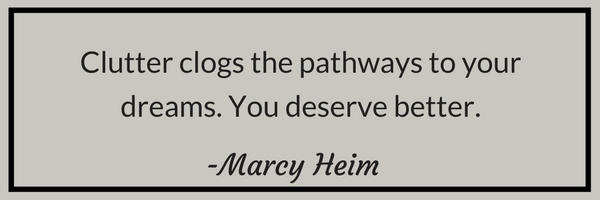Clearing Clutter from your Life

Ever look around your office or home and wonder how you would even begin to deal with all the stuff? Simply put, clutter is anything that gets in the way of living the life of your dreams. If you want a different job, a better relationship or greater peace of mind, but your life is filled with boxes of mementos, unworn clothes, papers or stacks of unread books, you’re clogging the path to your happiness. The over-consumption of digital stuff has the same effect on your brain as physical clutter.
So celebrate with me this recycle bin piled high with paper on the way out! The space of empty boxes is uplifting. The weight of that paper is gone!
Researchers at Yale have identified two areas in your brain that feel the loss of a valued possession the same as something that causes you physical pain. The more you’ve committed emotionally or financially to an item, the more it literally hurts your brain to come to terms with that fact that it should go.

When your brain has too much on its plate, it splits its power up. The result? You become awful at:
- filtering information
- switching quickly between tasks
- keeping a strong working memory
We joke about our forgetfulness as we age, but honestly, it is mainly a reflection of too much—stuff, information, and commitments—aka clutter.
Your clutter has a lot to tell you about what’s off-balance in your life.
5 clutter traps, the emotional issues around them, and what to do
– adapted from “What your clutter is trying to tell you” by Kerri Richardson
1. YOUR WARDROBE – Emotional issue: Nostalgia
What this means: Wardrobe clutter often means you’re holding on to a fantasy self—one that was more youthful, thinner, or happier—a time when you felt as if anything was possible. You want to feel that way again. This can also be behind dealing with extra pounds.
What to do: Ask, “How can I get the same fulfillment in my current life that those old clothes represent?”
2. YOUR DESK Emotional issue: Procrastination
What this means: Piles of paper may be an excuse to avoid moving on. Ignore the piles, hold off dealing with difficult issues or new (perhaps scary) opportunities. The pressure of the expectations alone is enough to keep the clutter on your desk.
What to do: Decide you want to move on – this one is pure mindset. Then end subscriptions, take pictures or scan old stuff you want to remember and PITCH.
3. YOUR CAR Emotional issue: No boundaries
What this means: Letting clutter pile up in your car means that no space is left for you. Your car should be your own space, not a dumping ground. Are you keeping your calendar full so you can tell yourself you’re too busy to make changes in your life?
What to do about it: Create “dates” with yourself and honor them as if you were another person. Be ok with the discomfort of disappointing other people. Dealing with boundary clutter leads to cleaner relationships, less stress, and deeper connections.
4. YOUR GARAGE/BASEMENT Emotional issue: Avoidance
What this means: Leaving boxes of possessions and unfinished projects to stack up means you lack the mental energy to face difficult tasks. Avoiding it lets you pretend it’s not there. But each time you see it, the mess before you saps your energy. You create a landfill in your home.
What to do about it: Get a friend who is unattached to the stuff and can be firm, block off a few large chucks of time (1/2 days) and get it gone!
5. YOUR ATTIC OR BASEMENT Emotional issue: Guilt
What this means: Family heirlooms, old cards and unwanted stuff are no longer of use — but you feel by getting rid of them, you’re betraying your loved ones. It layers on emotional baggage – obligations, memories, joy, sadness and regret.
What to do about it: If something makes you smile when you see it, it’s not clutter. Re-evaluate the worth and either say goodbye or make it a daily part of your life.
Clutter in your Year-End work impacts your results.
1. Clutter in your database or lists. Emotional issue: Nostalgia
How many folks are on the list that made one memorial gift and you think might become “regular” donors? Are bad addresses robbing your postage budget but you think you can reconnect? “We’ve always done it this way.”
2. Clutter on your board. Emotional Issue: Guilt
They may have capacity or influence, but face it; this mission is not their passion. You are disappointed in their performance. They are sorry they got talked into something they really don’t want to invest time and energy into.
3. Clutter in your year-end plan. Emotional Issue: No Boundaries
You’ve been into the online webinars again and every idea sounds great! Now you have so many ideas going – Giving Tuesday, segmenting, email solicitations, Facebook – your “plan” is more like throwing spaghetti at the wall and seeing if any of it will stick.
4. Clutter in your own life – your physical and emotional space. (see DESK above) Emotional Issues: No Boundaries, Guilt and Avoidance.
You are major gift officer or ED, mom/dad (aunt/uncle, grandparent, whatever) and volunteer. Your commitments, even though you “enjoy” them have left your life so full there is no down time for you – your quiet space and self-reflection (even raging extroverts need this). Besides, taking time for you feels selfish.
Clutter – Stand up for your mental and physical space!
Yes, clutter negatively affects your performance and joy, but it is your perception of clutter that matters, not someone else’s.
Personally – take a stand (and some action) on some of the clutter in your life. Professionally – step into your power and knowledge as an advancement professional and lead your year-end actions. Onward to less!
Invest in JOY®


Marcy Heim is a trusted authority in the development profession and helps organizations and educational institutions boost their major gift programs through artful, long-term relationship building that dramatically increases fundraising success while promoting increased staff job satisfaction. To receive a free chapter from Marcy’s book, Empower Your Board to Serve as Effective Development Ambassadors, click here.
Questions: Contact Cathy Yerges at Cathy@MarcyHeim.com
